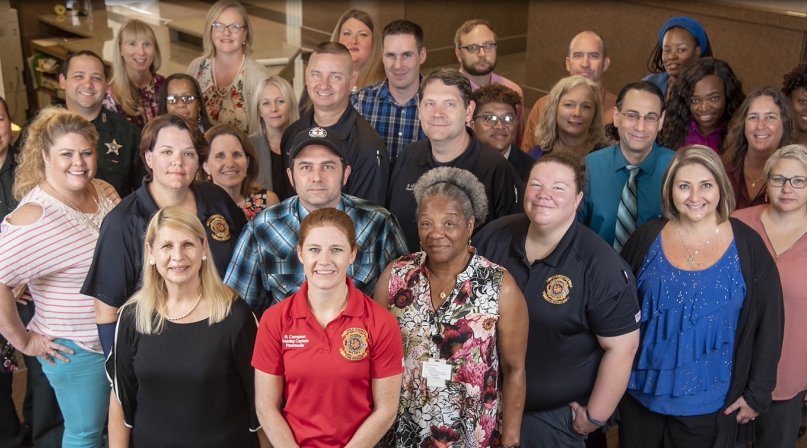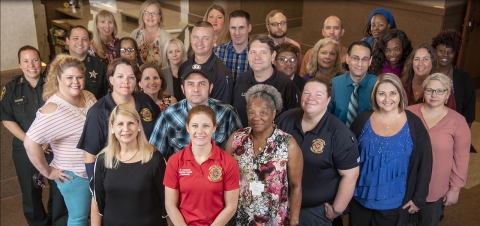Problem:
|
Mentally ill inmates experience recidivism and lose access to psychotropic medications.
|
Solution:
|
Provide support to inmates by connecting them to behavioral health providers and providing them with medications.
|
“The stars aligned” for collaborations among departments and agencies that led to the creation of a jail transition program in Polk County, Fla., Community Health Care Planner Cathy Hatch said.
The Helping HANDS program is for individuals with mental illness who are transitioning out of the local county jail and back into the community. “HANDS” stands for healthcare, access, navigation, delivery and support.
After Polk County Sheriff Grady Judd became aware of mentally ill individuals repeatedly cycling in and out of jail, his office and the county health and human service division formed a partnership to try to lower recidivism rates. Data revealed that 12 percent of inmates receive medications for mental health issues in jail and stop taking those medications when they are released.
While the county was researching possible jail transition programs, Polk County Fire Rescue was simultaneously researching a community paramedicine program that uses paramedics in proactive roles rather than reactive roles.
“Rather than rushing to 911 calls all the time, they [community paramedics] are out in the community doing a pro-active, more preventative type service,” Hatch said.
The two projects on jail transition and community paramedicine joined together to create the Helping HANDS program. In 2016, Polk County voted to continue a half-cent sales tax that provides health care for indigent citizens and generates $46 million annually. The program is funded through this tax.
“We came together and realized we could use the community paramedic idea paired with the jail transition idea to come up with a plan for our people,” Hatch said.
The goal of the program is to identify mentally ill inmates who experience recidivism and connect them to behavioral health providers and ensure they have access to medication. Polk County staff attended NACo’s Stepping Up webinars where they identified the Assess, Plan, Identify and Coordinate model for jail diversion.
Eligible participants of the Helping HANDS program must be Polk County residents, below 200 percent of the federal poverty line, have had two or more arrests in the past 12 months and must be prescribed and taking psychotropic medications in jail. The Helping HANDS program uses a data exchange between the jail and the Central Florida Behavioral Health Network to produce a list of potential clients who meet the eligibility requirements for the program.
Hatch said the county holds weekly staff meetings with up to nine different agencies to discuss who would be good candidates for the program. When a potential client’s name is called, information is shared from each agency, she said.
If the clients are accepted, a recovery peer specialist, who is an individual who has overcome their own mental health or substance abuse diagnosis, and a community paramedic are assigned to visit the client in jail to explain the program. The program is voluntary and if the client agrees, they are engaged in the program for the remaining period of their incarceration.
Candidates who are eligible may also receive an email about joining the program through the jail kiosk system. Potential clients can sign the online form or fill out a physical form with a healthcare provider in the jail, Hatch said.
When the client is released, the community paramedic picks them up and takes them home while also picking up a 30-day supply of their psychotropic medications purchased from the jail pharmacy. The funds from the half-cents sales tax help pay for the medications needed, since inmates lose their Medicaid benefits upon entering jail.
“We are notified when someone is being released and we can actually ask the jail to put a ‘helping HANDS’ hold on that individual so they don’t release them until we can get there and pick them up,” Hatch said.
The community paramedic meets with the client the first week they are back in the community, performs a health assessment, explains their medication and assesses their home. The peer specialist and community paramedic work to ensure the client is connected to a local behavioral health provider within 30 days after they are released.
After six to eight weeks, the program ends, but the peer specialist may stay in contact for support.
The first group of clients was enrolled in the program in June 2018. During this first year, Hatch said some clients needed medications beyond psychotropic medications to meet other health needs.
“This year, we’re buying all the medication they’re taking in jail no matter what it is as long as it’s under $500,” Hatch said.
When looking at the three months before the program and the three months after the program for a small group of 36 individuals from May 2018 to March 2019, clients had an 89 percent reduction in the number of jail days, a 66 percent reduction in the number of 911 EMS calls and an 88 percent reduction in hospital emergency room utilization, Hatch said.
“We know that while they’re in the program the arrest rate is really low,” she said. “Once they’re discharged, it’s a whole different story because they don’t have as much hand holding and we’re trying to improve that, and we are seeing some very promising results.”
The Helping HANDS program is unique because of the use of peer recovery specialists and community paramedics that work together as a team, as well as the partners who agreed to sign data sharing agreements and releases of information, Hatch said.
“The purpose is to help people. There’s a problem that needs to be solved,” Hatch said.
“I think we really don’t have any arguments that this program is needed no matter which side of the aisle you’re on.”
Polk County’s Helping HANDS program for jail transition is the recipient of a 2019 NACo Achievement Award in the Criminal Justice and Public Safety category.





